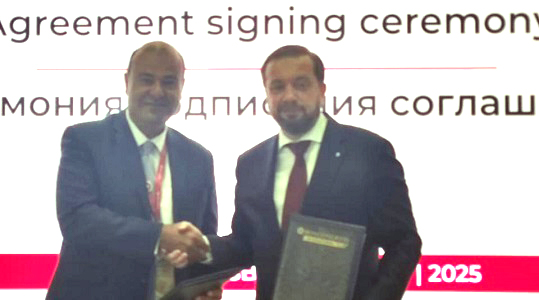During his participation in a session titled "National E-Commerce: Setting New Rules" at the 28th St. Petersburg International Economic Forum (SPIEF 2025)—organized by the Roscongress Foundation and held under the patronage and in the presence of Russian President Vladimir Putin, along with several global leaders, including former Brazilian President and current BRICS Bank President Dilma Rousseff, ministers from Russia and Arab countries such as Saudi Energy Minister Prince Abdulaziz bin Salman, and Bahrain’s National Security Advisor and Commander of the Royal Guard Sheikh Nasser bin Hamad Al Khalifa—Secretary General of the Union of Arab Chambers, Dr. Khaled Hanafy, stated that: “Global e-commerce sales are expected to reach $7.5 trillion by 2025, up from $5.7 trillion in 2023. The Arab region is witnessing rapid growth in e-commerce, with the market projected to reach $50 billion by 2025, compared to $49 billion by the end of 2022. There has been a significant rise in digital payment adoption, with 60% of consumers now preferring digital channels for online shopping, marking a 20% increase since 2021. The six GCC countries and Egypt account for 80% of e-commerce activity in the Arab region, highlighting a concentration that could hinder competition and innovation among small businesses.”
He pointed out that: “The value of the artificial intelligence market in e-commerce is estimated at $7.25 billion in 2024, and it is expected to grow to $9.01 billion by 2025. As for blockchain technology, its market value is projected to rise from $17 billion in 2023 to over $943 billion by 2032.”
He concluded by saying: “This transformation is reshaping industries and creating new opportunities for growth and development, especially in regions like the Arab world, where the private sector is embracing digital tools to drive economic expansion. However, bridging the digital divide, strengthening regulatory frameworks, and fostering innovation across industries require joint efforts and cooperation between the public and private sectors. There is no doubt that the Arab region—with its young population, increasing internet penetration, and entrepreneurial spirit—is well positioned to benefit from these changes and lead the charge in this digital revolution.”
On the sidelines of the forum, the Secretary General of the Union met with St. Petersburg Governor Alexander Beglov, where they discussed current international developments and the importance of strengthening cooperation and building strategic partnerships between Russia and the Arab world, given the significant natural and human resources both sides possess.
In parallel with the forum’s proceedings, a cooperation agreement was signed between the Roscongress Foundation—the organizer of the St. Petersburg International Economic Forum and one of Russia’s leading development institutions with a social focus, as well as a key organizer of national and international conferences, exhibitions, and events in the fields of business, youth, sports, and culture—represented by its Chairman Alexander Stuglev, and the Union of Arab Chambers, the official representative of the Arab private sector, represented by its Secretary General, Dr. Khaled Hanafy.
Dr. Khaled Hanafy explained that: “The main areas of cooperation outlined in the agreement between the two parties focus on developing joint international communication platforms to stimulate interaction between governments across various sectors. The agreement also aims to strengthen existing partnerships and build new long-term collaborations between business communities in the Arab world and Russia. Additionally, it seeks to facilitate dialogue on cooperation in the fields of investment and finance, export and import activities, as well as tourism and cultural exchange. It also includes the promotion of topics related to events organized by both sides, with the goal of enhancing mutual engagement and understanding.”

